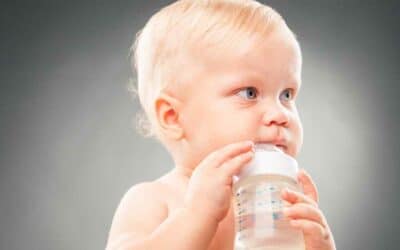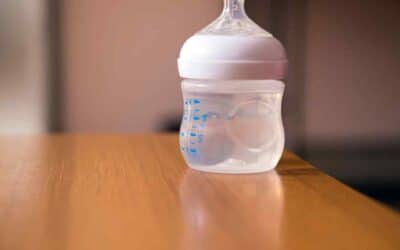Water is one of the most important things you can have in your home. It’s not just a necessity to stay hydrated—it’s also a way to stay healthy and feel refreshed.
But what if you don’t have access to clean, safe water? What if you live somewhere where there are no regulations on drinking water? What if you need to fill up a large container quickly, like for an emergency?
That’s where distilled water comes in! Distilled water is a great alternative to tap water and bottled water because it’s distilled by removing all of the minerals and pollutants from the source water. It doesn’t have any impurities or contaminants, and it tastes better than other types of water!
In this article, we’ll answer all of those questions and more. We’ll break down what distilled water is, why you should use it, and how to find a good source. Then, we’ll cover how much-distilled water costs at different locations.
Finally, we’ll suggest where to buy distilled water if none of our recommendations work for you!
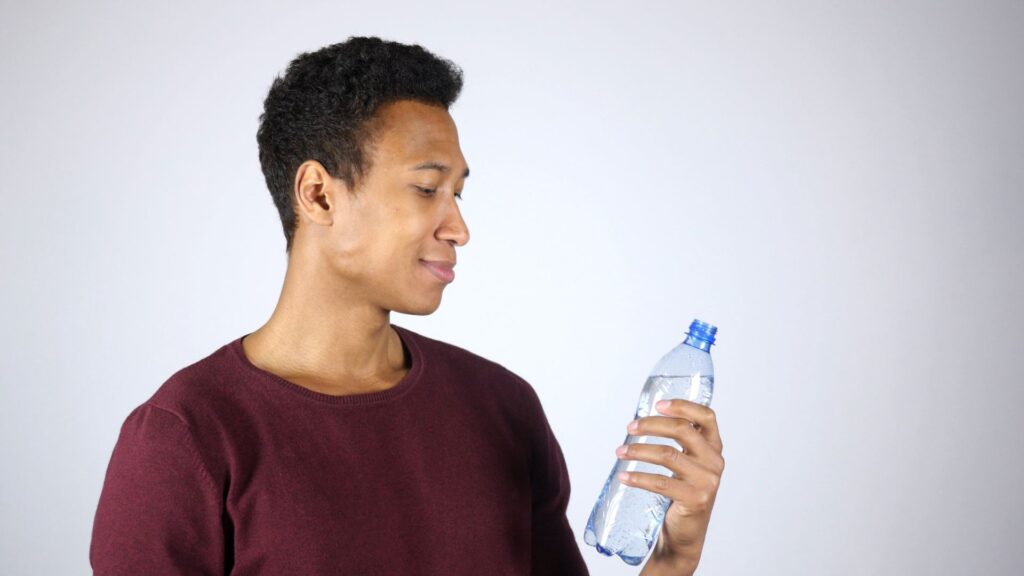
Understanding Distilled Water
Distilled water is an excellent source of pure drinking water, free from chemicals and minerals. It has no taste or odor and is safe to drink. Distilled water can be used by anyone who needs to stay hydrated throughout the day.
In addition to being healthy for adults and children alike, infants can also consume distilled water with no problem whatsoever. It is probably even more important for infants to drink distilled water than adults because their bodies are still developing, so they need nutrients from food and the fluids they consume.
One thing that makes distilled water such a great choice for babies is its lack of impurities or contaminants – it has been purified through steam distillation so that nothing remains but pure water molecules in their natural form (H2O).
How is it Made?
Distilled water is pure water that has been purified by distillation. Distillation involves boiling the water, collecting the steam, and then condensing the steam back into a liquid. This process removes all impurities from the water, including heavy metals, minerals, and salts.
Distilled water is a form of purified water that has been purified by distillation. It’s created by boiling the water and then collecting only the steam that evaporates from the boiling point, leaving any contaminants or impurities behind.
This process causes impurities to be left behind in the container where they were originally boiled and allows for only pure steam to be collected.
Benefits of Drinking Distilled Water
Distilled water is the best choice for babies because it has no mineral content and is free of any impurities that may cause harm. The following are the benefits of drinking distilled water:
Removes Impurities and Contaminants
Distilled water is free from bacteria, contaminants, dissolved minerals, and chemicals. It contains no harmful impurities. Drinking distilled water regularly can help to remove unwanted toxins from your body and promote weight loss.
Helps With Digestive Issues
One of the biggest benefits of drinking distilled water is that it can help with digestive issues, including bloating and constipation. It is also said to aid in weight loss by improving the body’s ability to absorb nutrients from food, helping to flush out toxins in your body that may be causing irritation and inflammation.
The reason for this is that when you drink plain water, it helps flush out toxins from your body. This can help with a number of things like constipation and diarrhea.
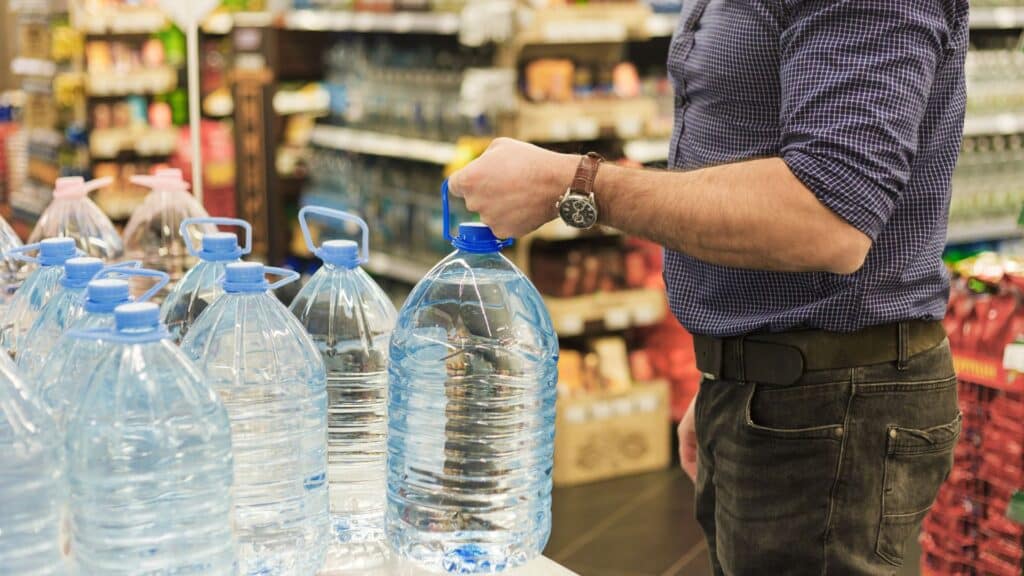
Supports Healthy Skin and Hair
Drinking distilled water has positively affected skin, hair, and nails. The minerals that make up the water are not present in the final product, so it helps to reduce the amount of chemicals and toxins you are exposed to. This is especially true if your tap or bottled water has been treated with chlorine or fluoride.
The minerals in your body play an important role in keeping your hair healthy, so it’s important to ensure you get enough of them from drinking water. Most of us don’t drink enough water daily, leading to dry hair and brittle nails. If you start drinking distilled water regularly, you may find that your hair is shinier and more manageable than before!
Enhances the Taste of Drinks and Cooking
The taste of distilled water is refined and smooth. When you drink it, you can enjoy the purest form of water with no impurities or other chemicals. This means that when you drink distilled water, your body will get all the nutrients it needs while also getting rid of all the bad stuff like chlorine and fluoride from tap water.
Additionally, when distilled water is used for cooking, it will enhance the flavor of your food because there are no impurities to mask the natural flavors of your food.
Where to Buy Distilled Water
There are several places where you can buy distilled water. It’s best to buy it from a store that specializes in selling water so that you know what kind of quality you’re getting.
Grocery Stores
Grocery stores are great places to buy distilled water, but they can be hard to find. If you’re looking for distilled water in your local grocery store, look for it near the baby formula and other powdered products.
You can find it in the water section of your local grocery store. It’s usually sold in plastic bottles under 30 liters at places like Target, Walmart, and Costco. It’s also available in gallon jugs for around $4 at places like Sam’s Club and BJs Wholesale Club.
If you can’t find it at your local store, try calling customer service and asking them if they have any plans to start selling it. If not, ask them to consider stocking it in the future!
Health Food Stores
Health food stores are great places to buy distilled water because they have a wider selection than other stores. If you’re looking for a specific brand but don’t want to order online, this is where it’s likely to be found.
Some health food stores also sell water filters that can help you purify the tap water in your house. This is a great option if you’ve got a well or another source of water that isn’t safe for drinking and cooking.
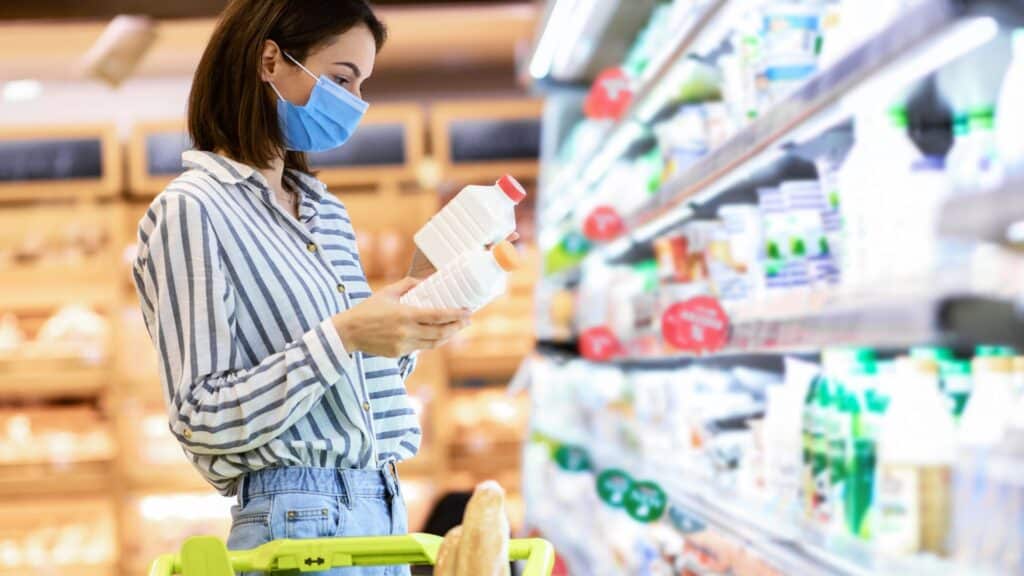
Online Retailers
If you’re looking for distilled water, you’ve come to the right place. We have a comprehensive list of where to buy distilled water online. The first place to start is with a search engine like Google or Bing. Type in “where can I buy distilled water” and look at the results. You’ll likely see some retailers and other sources that sell distilled water online.
One of the most popular retailers of distilled water is Amazon. They offer a variety of brands and sizes, so you can choose what’s best for you and your budget when it comes to buying distilled water online from them.
Another retailer that offers distilled water is Wal-Mart, which only sells certain brands and sizes. Other retailers include Target and eBay – both also carry many different brands and sizes for sale online! Note that it is important to check the products purchased online.
Water Dispensers and Vending Machines
If you have access to a water dispenser or vending machine, that’s an easy way to buy distilled water. Just be sure to check the label to make sure it’s distilled and not just purified or filtered.
Distilled Water Delivery Services
The best places to buy distilled water are grocery and convenience stores. You can also find it at most pharmacies and big box retailers. You can also get it at a specialty store, but you’ll pay more for the distilled water there than you would if you bought it at a grocery store or convenience store.
If you’re in a hurry or want to save money, look for your local grocery store’s distilled water delivery service. The cost of this service varies depending on your location and the size of your order, but it will almost always be cheaper than buying bottled water from a store.
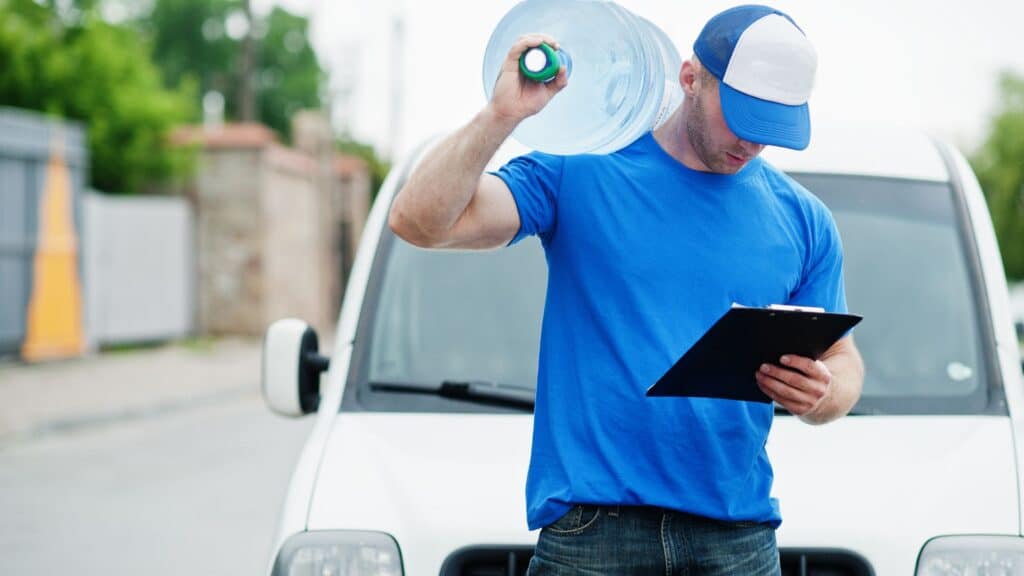
How to Choose the Right Distilled Water
When choosing the right distilled water for your needs, you must know what you’re looking for. Here are a few things to keep in mind.
Check for Certifications and Seals of Quality
The NSF (National Sanitation Foundation) or FDA (Food and Drug Administration) seal of approval on the bottle adheres to all of their standards. These are especially important if you plan to use this water in your home, as they ensure it’s safe for consumption.
Read the Label for Source and Purification Methods
Distilled water comes from a variety of sources, such as municipal water supplies, springs, and wells. It’s also purified in different ways. When choosing distilled water, it’s important to read the label to ensure it meets your needs.
Look For BPA-Free Packaging
One type of packaging that’s better than others is BPA-Free packaging. BPA stands for bisphenol A, and it’s known to be harmful to humans. It’s found in many materials, including plastic bottles and cans. BPA has been linked to cancer, obesity, heart disease, diabetes, and more. If you want to avoid these health issues and other environmental concerns, consider buying distilled water with BPA-free packaging.
Consider the Cost and Availability
If you’re considering a purchase of distilled water, it’s important to consider the cost and availability of your preferred brand.
The cost of distilled water varies depending on where you live, so it’s important to research before purchasing. Also, if your local store doesn’t carry your favorite brand, plenty of online retailers can help you out.
Using Distilled Water in Your Morning Routine
Adding distilled water into your daily routine can contribute to a healthier lifestyle. Consider starting your day with a glass of distilled water. Let’s dive into why you should make it a part of your morning routine and how to do it.
Waking up to a glass of distilled water can kick start your metabolism and eliminate the toxins your body has cleaned out while you were asleep. Consuming distilled water on an empty stomach can help cleanse the colon, making it easier for your body to absorb nutrients. Not to mention, the lack of any unique taste or odor may make it easier for some to consume more water, especially those who struggle to meet their daily water intake requirements.
Preparing a glass of distilled water as part of your morning routine is convenient. You can store it in a clean pitcher overnight in your refrigerator and consume it first thing in the morning before breakfast. For those who prefer warm water, consider warming a glass of distilled water on a stovetop or microwave. Make sure not to reboil it to prevent the unnecessary reintroduction of impurities.
Incorporating distilled water into your daily routine is a simple and effective method for a healthier lifestyle. It promotes digestion, increases metabolism, and helps your body absorb the nutrients it needs to perform at its best. When you get a great start to your day, the rest is likely to follow!
Remember, though distilled water has tremendous benefits, it’s also crucial to maintain a balanced diet as distilled water is stripped of all minerals that are commonly found in regular water. If this balance is maintained, distilled water is an excellent way to kick start a healthier lifestyle.
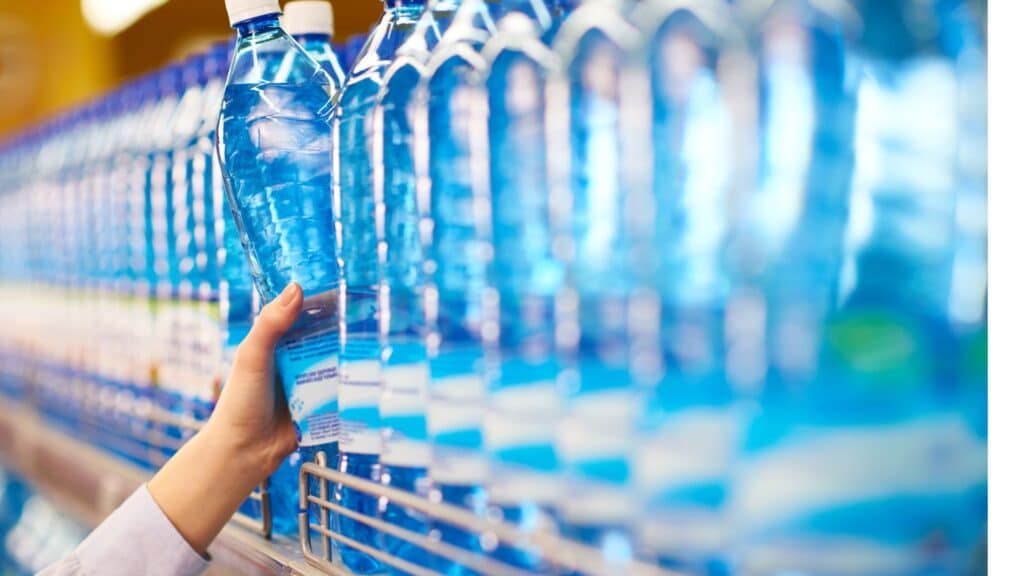
Consulting with Pediatricians and Health Professionals
When choosing water for your baby’s formula, it is essential to consult with pediatricians or other health professionals for personalized recommendations. These experts can provide guidance based on individual factors such as geographic location, water source quality, and any specific health concerns.
Geographic Location
The quality of water sources can vary greatly depending on your geographic location. Local water suppliers and regional regulations can impact the safety and quality of tap water. In some areas, tap water may contain higher levels of contaminants, such as lead, nitrates, or bacteria, that could pose a risk to your baby’s health. Pediatricians and health professionals can provide guidance on the water quality in your area and recommend appropriate water sources for your baby’s formula.
Water Source Quality
Water source quality is a crucial factor to consider when choosing water for your baby’s formula. Tap water, filtered water, and bottled water each have their pros and cons, as discussed in previous sections. Health professionals can help you evaluate the quality of your water sources and suggest the most suitable option for your baby based on the local water quality report and any specific concerns you may have.
For example, they may recommend boiling water before using it for formula preparation or suggest using distilled or purified water as a safer alternative. If you use liquid concentrate formula, health professionals may advise using purified bottled water to dilute the concentrate, ensuring that the water meets safety and quality standards.
Specific Health Concerns
Some babies may have specific health concerns or conditions that require special consideration when choosing water for their formula. For example, premature infants or babies with compromised immune systems may need additional precautions to ensure the safety of their formula water. In such cases, pediatricians and health professionals can provide tailored recommendations based on your baby’s unique needs.
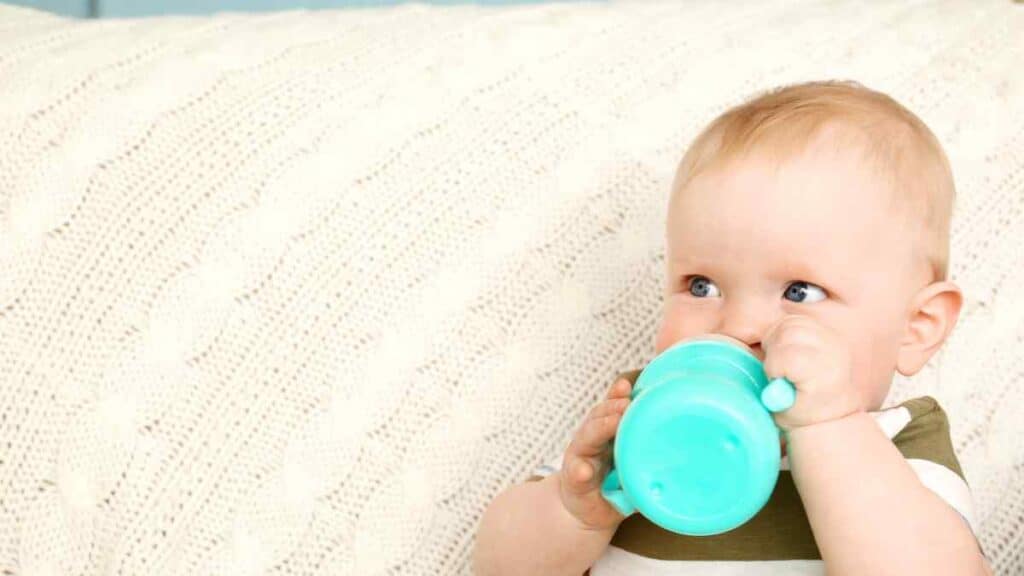
When Should You Give Your Baby Water?
Besides breast milk or formula, you may start giving your baby water after they reach six months, just as when you introduce solid foods as part of their diet. You can begin by offering them small amounts of cooled water as they slowly transition to solid foods. It’s also a technique that’s especially advisable for parents with children ages one-year-old and up.
However, it would help to remember that water should not replace breast milk or formula as this should still be their primary source of nutrition until they reach one year old. Although it may seem easier to give them water, their bodies have yet to adapt to it, causing them to experience nutrient loss and even water intoxication.
Many parents often use a sippy cup when teaching their younger babies to drink water. During this period, providing them with a sufficient amount of baby water can be helpful as your baby becomes more active. It’s also a highly advisable technique, significantly when raising breastfed babies.
Young Children Ages A Year Old
Once your child reaches 12 months old, it’s time to reduce breast milk intake gradually. You may start by slowly introducing them to the concept of breakfast, lunch, and dinner as part of their new routine. Additionally, it’s the perfect time for them to discover new foods other than breast milk or formula.
Ideally, kids should have at least 8 ounces of drinking water daily to stay hydrated while preventing water intoxication. You would then need to increase the amount each year as your child becomes more active. When babies drink water, it ensures they have proper bowel movements while replacing lost fluids.
Is Mineral Water Good for Your Baby?
As we’ve explored the various types of drinking water for babies, you may wonder if mineral water is the best choice for your little one. In this column, we will delve into the benefits of mineral water and how it compares to other options like tap water, spring water, and purified drinking water.
The Food and Drug Administration (FDA) regulates bottled water, ensuring it meets specific safety and quality standards. However, not all bottled water is created equal, and the mineral content can vary significantly between brands. This variation is essential to consider when choosing a bottled water brand for your baby.
One of the most significant benefits of mineral water is the presence of essential minerals, such as calcium and magnesium, which support your baby’s growth and development. Drinking spring water and mineral water can provide these essential minerals in addition to what your baby receives from their diet. Unlike purified drinking water, which undergoes processes like reverse osmosis and distillation to remove impurities, mineral water retains its natural mineral content.
Some mineral water brands even offer alkaline water, which has a higher pH than regular water. Advocates of alkaline water claim that it can neutralize acid in the body and provide potential health benefits. However, the scientific evidence supporting these claims is limited, and more research is needed to determine if alkaline water is beneficial for babies.
While mineral water has its advantages, there are some factors to consider when choosing the best water for your baby. One aspect is the total dissolved solids (TDS) level, which indicates the concentration of dissolved substances in the water. High TDS levels can indicate the presence of contaminants, so it’s essential to check the label and ensure the TDS level is suitable for your baby.
Another concern is the packaging. Some plastic bottles used by bottled water companies can contain chemicals that may leach into the water, especially when exposed to heat or sunlight. Opting for a reputable bottled water brand that uses safe and high-quality packaging materials can help mitigate this risk.
Lastly, it’s worth noting that municipal water supplies in many areas are safe and regulated, making tap water a viable and cost-effective option for older infants and toddlers. However, parents should consider boiling tap water or using a water filter for added safety, especially for younger babies.
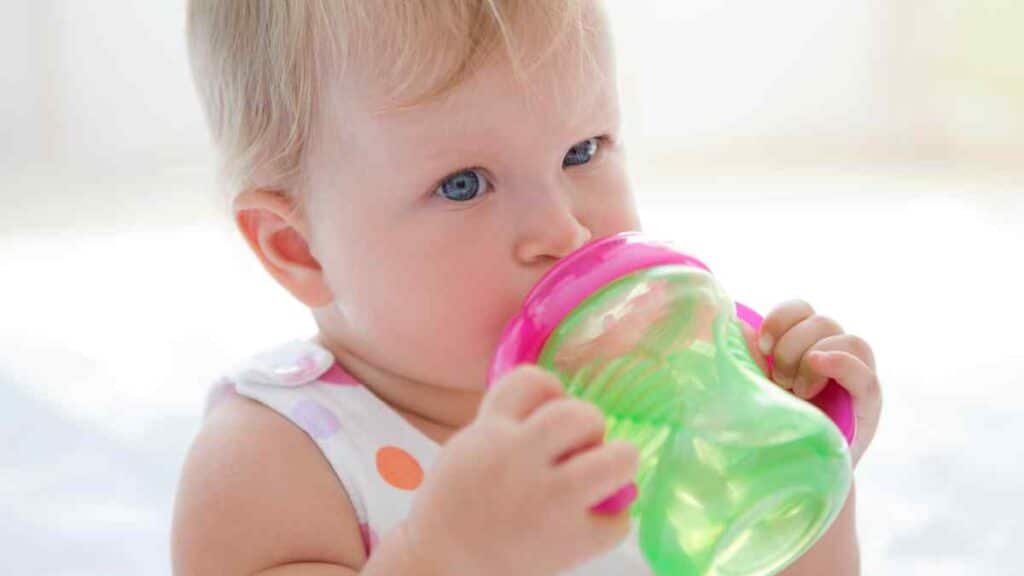
How to Keep Your Baby Hydrated
Typically, you must give your child access to drinking plain water to keep them hydrated. However, there are times when kids tend to act out, making it challenging to keep them adequately hydrated even with their favorite baby drinks. So, if you find encouraging your baby to drink water difficult, here are a few tips you can consider.
Frequent Sips are Advisable
Besides a dilute formula of cow’s milk, one effective way to let them stay hydrated is to offer small amounts of water throughout the day. You don’t need to ask them to drink 8 ounces of bottled water at once. Even a few sips from their sippy cup can already help. Meanwhile, if you want to try out diluted fruit juice, it’s highly advisable to limit their intake to 4 ounces daily, especially if you’re transitioning from breast milk or formula.
Capture Their Attention
Another way to encourage your child to drink baby water is by capturing their interest with creativity. You can make the entire process fun by introducing them to various shapes and colors. Consider using colorful straws or cups shaped like their favorite cartoon characters to get them excited.
Consider Their Activities
Children don’t have the same capability to regulate their body temperature as adults. So it’ll be much more challenging for them to cool off, especially when exposed to the hot weather or strenuous activities.
It’s essential to keep them hydrated before and after each activity. It’s best to encourage them to drink fluids during exercise. As a general rule, letting babies drink the water of 4 ounces every 20 minutes is a must. It’s a general rule to give them all the hydration without water intoxication.
Introduce Liquid Foods
Besides encouraging your child to eat solids, you can also start introducing your kids to water-rich foods after one year of age as you transition from breast milk or formula. It can be as simple as juices from undiluted fruit juice such as apples, grapes, oranges. You can also consider giving them flavor water or naturally sweetened drinks from lemon or cucumber! It’s an excellent choice if you want to let babies drink water independently.

Telltale Signs of Infant Dehydration
It’s only standard for a parent to get worried about their baby, especially if they notice signs of dehydration. So, here are a few symptoms of infant dehydration to serve as a guide. If you see any of these signs, it’s best to get in touch with your pediatrician.
- Fewer diaper changes compared to previous days/ lack of wet diapers
- Showing increased signs of exhaustion
- Sunken fontanelle, or the soft spot located on the infant’s head
- Dry mouth
- There aren’t any tears when the baby is crying
Understanding The Water Distillation Process
One common type of purified water that often surfaces in discussions is distilled water. Whether it’s for preparing baby formula, drinking, or even filling the iron, most parents prefer distilled water for its purity. This column aims to provide a comprehensive understanding of the water distillation process and its implications for our daily lives.
Implications for Drinking Water
One of the most common uses of distilled water is for drinking. Because it’s free from most impurities, many people prefer to use it in areas where municipal water supplies may not be reliable, or for those who prefer not to drink fluoridated water, common in many tap water supplies.
While small amounts of fluoride are beneficial for preventing cavities, particularly in permanent teeth, extreme cases can lead to fluorosis. Many experts often advise pregnant women, babies, and other vulnerable populations to limit their fluoride intake, and choosing distilled water can be one way to do that.
Role in Baby Formula Preparation
Many experts often recommend distilled water for preparing baby formula. Its high level of purity ensures that babies, who are particularly sensitive to contaminants, are given clean water.
However, it’s worth noting that distilled water lacks the extra minerals found in other types of water. While this isn’t an issue for adults, who get these minerals from solid food, it can be a point to consider for babies. The baby formula must provide these necessary minerals, given the role they play in a baby’s growth and development.
Other Uses of Distilled Water
Apart from drinking and baby formula preparation, distilled water is also ideal for use in certain household appliances like water softeners, steam irons, and humidifiers. The lack of minerals prevents build-up that can damage these devices over time.
Different Types of Bottled Water For Babies
In our previous column, we explored the benefits of mineral water for babies and discussed the importance of choosing the right type of water for your little one. As a natural progression, let’s delve into the various types of bottled water available and how they differ from one another. This column, titled “Different Types of Bottled Water for Babies,” will provide an overview to help you make an informed decision when selecting water for your baby.
Tap water
While tap water is readily available and regulated by municipal water supply systems, it may not always be the best option for young infants. Boiling tap water or using a home water filter can improve its safety, especially for babies under six months of age. As your baby grows, tap water can be a suitable and cost-effective choice as long as it meets safety standards.
Spring Water
Spring water flows naturally from an underground source and is bottled at the source. It contains various minerals that are beneficial to the human body. Spring water can be a good option for babies, as it retains its natural mineral content. However, always check the label for information on the source, treatment process, and the million total dissolved solids (TDS) to ensure the water’s safety and suitability for your baby.
Distilled Water
Distilled water is produced by boiling water and collecting steam, which leaves behind impurities. This process results in water with a higher boiling point and a lower mineral content. While distilled water is safe for babies, it lacks the essential minerals found in spring and mineral water, making it a less ideal choice as a regular source of drinking water for your little one.
Reverse Osmosis Water
Reverse osmosis (RO) water undergoes a purification process that removes contaminants by forcing water through a semipermeable membrane. While RO water is often referred to as “filtered water,” it’s important to note that this process also removes many beneficial minerals. As a result, RO water might not be the best choice for babies as their primary drinking water source.
Sparkling Water
Sparkling water is carbonated, either naturally or artificially, by dissolving carbon dioxide into the water under pressure. Due to its carbonation, sparkling water can cause gas and discomfort in babies, making it an unsuitable choice for their consumption.
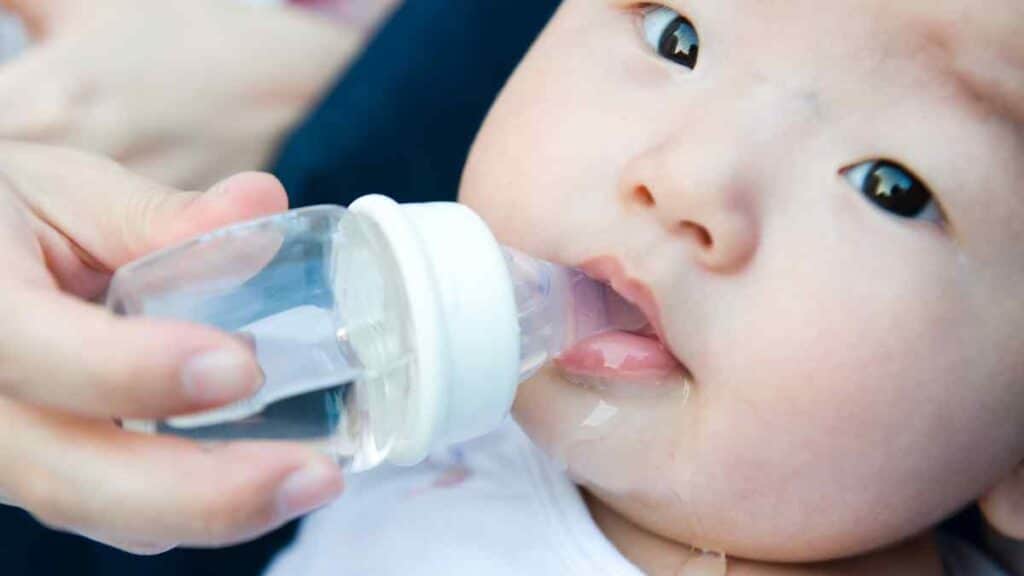
How Should Bottled Mineral Water Be Stored?
As we have discussed the different types of bottled drinking water for babies, it’s equally important to consider the correct storage of bottled water. Proper storage can maintain the quality and safety of the water, ensuring your little one receives the health benefits from its essential minerals. Let’s discuss a comprehensive guide broken down into several sub-sections.
Understanding the Importance of Proper Storage
Bottled water, including spring water and mineral water, is regulated by the Food and Drug Administration (FDA) to ensure its safety and quality for human consumption. However, even with these regulations, the way you store bottled water can affect its safety and taste. Poor storage conditions can potentially lead to the leaching of chemicals from plastic bottles into the water, which could impact your baby’s health.
Choosing the Right Storage Location
Many bottled water companies recommend storing their products in a cool, dry place away from chemicals, solvents, and strong odors. Heat and sunlight can degrade the plastic over time, potentially releasing harmful substances into the water. Therefore, avoid storing bottled water in places like a garage or a car trunk, particularly during the summer months.
Refrigerating Bottled Water
While it’s not necessary to refrigerate unopened bottled water, once opened, it’s best to keep it chilled to slow down the growth of any potential bacteria. However, be sure to consume it within a few days after opening for the best quality and safety.
Use of Reusable Water Bottles
If you’re transferring water from a purchased bottle to a smaller, reusable water bottle for convenience, ensure the reusable bottle is made of a safe material and is cleaned regularly. Plastic bottles marked with recycling codes 1, 2, 4, and 5 are generally considered safe for reuse. Always wash and thoroughly dry reusable water bottles between uses to prevent bacterial growth.
Transitioning to Home Water Purification Systems
For those considering a shift from bottled water to tap water, consider using a home water purification system to ensure the water’s safety. Systems such as reverse osmosis and water filters can effectively remove contaminants while preserving other minerals beneficial to the human body. Always follow the manufacturer’s instructions for maintaining and replacing these systems to ensure optimal performance and safety.
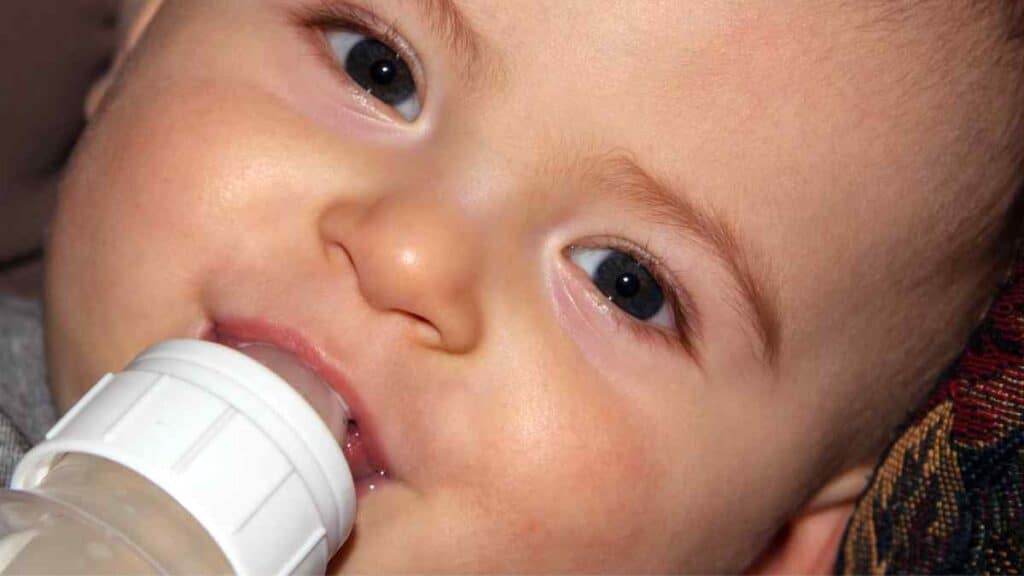
What is the Healthiest Water To Drink For Your Baby?
As we delve into the proper storage of bottled mineral water to maintain its quality and safety, let’s turn our attention to the crucial question: What is the healthiest water to drink for your baby? With numerous options available in the market, from spring waters to artesian water, this question is more relevant than ever for parents.
Understanding Water Types
When it comes to drinking water, different types come with varying mineral content and potential health benefits. Bottled waters often undergo a filtration process to remove any impurities, and some brands even have their own bottling plant to ensure the water’s safety and quality. However, not all bottled waters are created equal.
Spring and Artesian Water
Spring waters flow naturally from a spring and usually contain beneficial minerals. Artesian water, on the other hand, comes from a well that taps into a confined underground aquifer. Both types of water can be excellent choices for your baby due to their natural mineral content. However, always check the labels for any additional treatments or processes these waters may have undergone before reaching the bottle.
Filtered Tap Water
While normal water directly from your tap may not always be the best option for young infants, it can be made safer and healthier through the use of water filters. These filters effectively remove chlorine, lead, and other contaminants, providing you with clean and safe drinking water for your baby. Plus, it’s a more environmentally-friendly choice compared to single-use plastic bottles.
Mineral Water
Mineral water, as we’ve discussed in our previous columns, contains essential minerals like calcium and magnesium that are beneficial for your baby’s growth and development. The mineral content, however, can vary significantly between brands, so it’s essential to check the labels.
Determining the Healthiest Water for Your Baby
So, what’s the healthiest water for your baby? The answer largely depends on your baby’s age and specific nutritional needs, the water quality in your area, and your personal preferences. Purified or boiled tap water is usually recommended for younger infants, especially those under six months. Spring water, artesian water, or mineral water can be healthy choices for older babies and toddlers due to their natural mineral content.
Conclusion
In conclusion, distilled water is a healthy and safe alternative to tap water and bottled water. It is free from impurities, contaminants, and minerals and offers many benefits, such as improving digestion, promoting healthy skin and hair, and enhancing the taste of drinks and cooking.
You can purchase distilled water at grocery stores or specialty stores selling water. Drinking distilled water is a great way to ensure you’re drinking clean, healthy water free of toxins and chemicals, making it an excellent option for those who are health-conscious or have specific health needs.
If you have any questions, please feel free to comment below, and I’ll do my best to answer them.

